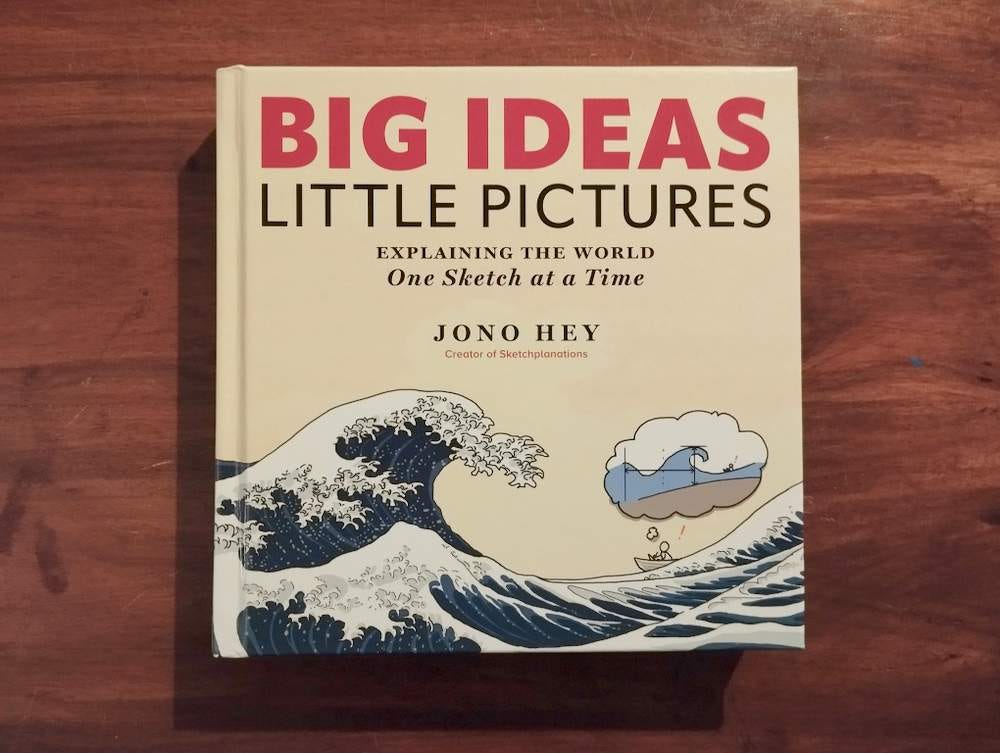Open Thread: What are your most helpful ideas for difficult times?
Keeping the faith, one working hypothesis at a time.
This is Everything Is Amazing, a newsletter about science, curiosity and runaway balloons, large and small.
This week I’ve been greatly enjoying this book:
It collects together around a hundred of Jono Hey’s brilliant Sketchplanations, unpacking tricky concepts in a brilliantly accessible way - and reading it is like romping through a natural history of ideas, assembled by the most fun & restlessly interested person you know.
There’s huge value in reading a book like this when the international news is feeling a bit too much. While I’m glad to see that NASA’s proposed layoffs have been stymied for now, and something similar is now happening in the US National Park Service, much remains chaotic - and good people in & out of the sciences are losing their livelihoods over there.
Aside from pointing you once again to this quote by Nick Cave, I figure the best thing I can do for now is continue with this season’s look at the invisible sea above our heads - and I’ll be doing that in the next edition.
But before that, maybe it’s a good time to share a few ideas that are keeping me grounded and able to think my way forward into what comes next, in the hope you find them useful - after which, I’d love to hear yours?
Okay. Here we go.
Other people are, on the whole, decent - and when they’re not, they’re usually acting out of fear. I concluded this after meeting a lot of random folk when I was working as a travel writer, and while evil people certainly exist I still think this rule is generally true - and over a decade of working on an internet riddled with negativity bias and conspiracy theorists still hasn’t persuaded me otherwise.
Hanlon’s Razor: “Never attribute to malice that which is adequately explained by stupidity or incompetence.” (Sketchplanations just did a whole podcast episode on this.)
Sowden’s First Law Of Curiosity: “You just have to try lots of different things for no damn reason.” (I explain why here.)
While negative partisanship (the tendency for people to rally around their shared opposition to something) has a role to play, especially in politics and especially right now, it also creates cynicism, exhaustion, negational identities and a general sense of rage-fuelled hopelessness. In contrast, I think the real power - and therefore the most important work in the long run - is in bringing people together in common purpose around what they want to see in the world. Or at least reminding them that such a thing can exist? Remembering what you’re fighting for is also vital in creating the foundations for a strong opposition - and standing for something also allows for the possibility of mutually respectful understanding, fruitful negotiation and genuinely impactful bridge-building. Take journalist Mónica Guzmán’s findings as an example here.
If you’re anxious, break a sweat - say, by shovelling snow like
in Montana, or filling a bucket with sea-coal like some idiot in Scotland. Let your body process some of that nervous energy and it’ll all feel a bit easier. This includes fidgeting! (Related: this John Muir quote - “As soon as we take one thing by itself, we find it hitched to everything else in the universe.”)The stronger your opinion, the less you’re inclined to be curious about what you might have got wrong. This almost always turns out to be a bad thing. (Related: asking questions is often a hard, uncomfortable business that can rile other folk up no end, but it’s always preferable to relying on unexamined cognitive shortcuts and intuitive thinking, as
explains here).The Protegé Effect: the very best way to learn something is to commit to teaching it to other people straight after you’ve learned it, with all the breathless enthusiasm of a mind-blown student. (See: the entire business model of this ‘ere newsletter.)
Never forget the Rumsfeld Matrix (hat-tip
): what you think you know & what you think you don’t know are both massively outweighed by the unimaginable vastness of what you don’t know you don’t know - and there’s a lot of joy waiting for you if you make an effort to discover some of the latter. (Related to this: points 1-7.)
OK! Your turn…
What are your most helpful ideas for difficult times?
Give me your best, nerdiest and most heartfelt answers in the comments below.
Thanks!
UPDATE:
also just did one of these listicle-ideas things, but hers is better than mine, dammit:Image: Gaelle Marcel.





Going for walks in nature reminds us that the natural world goes on no matter what idiotic humans are doing. Whales are especially wonderful to watch in these trying times. Do volunteer work that makes you feel better about making your corner of the world better. Watching comfort TV shows and reading books that you love.
Anxiety only lives in the future and therefore, it never needs to tell you the truth. That’s why it’s so frightening.